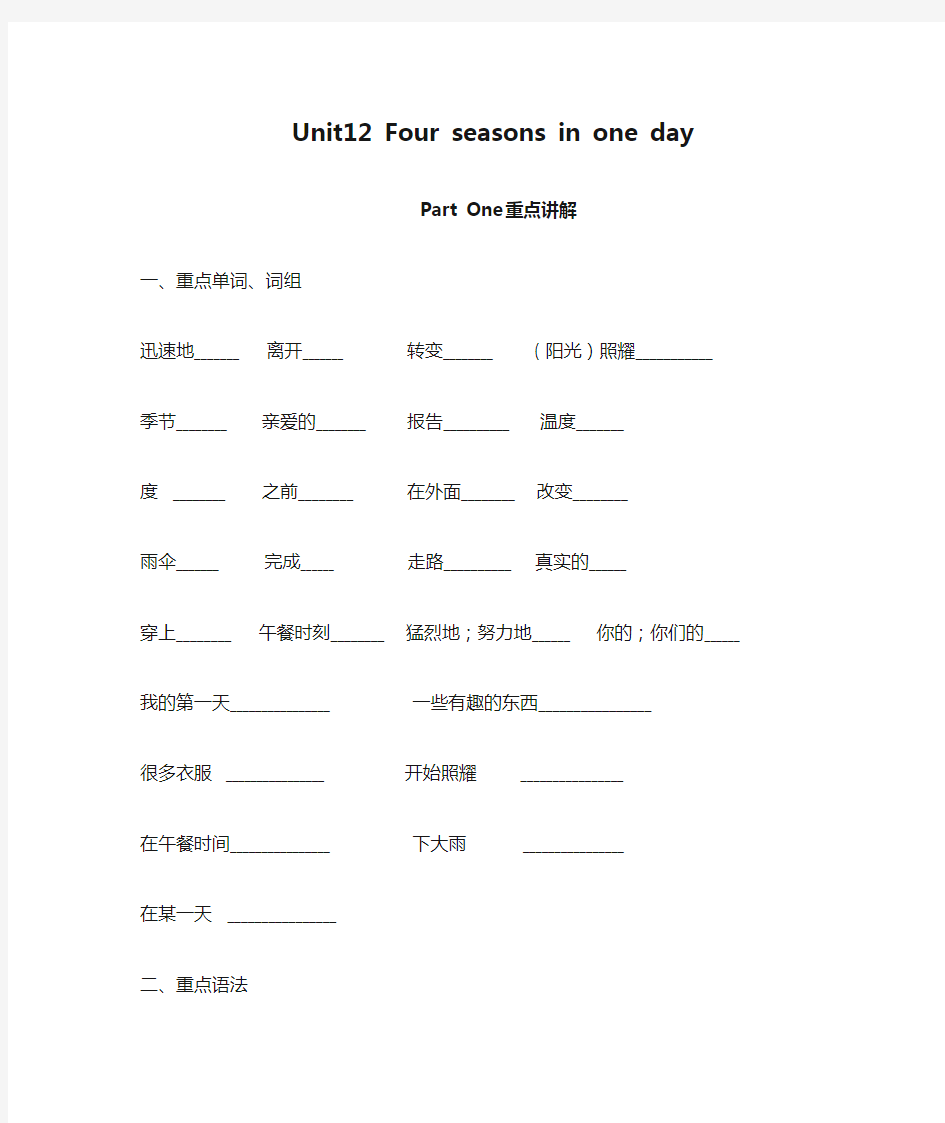
广州版小学英语 五年级上册英语 Unit12 Four seasons in one day
- 格式:docx
- 大小:99.84 KB
- 文档页数:6


Unit12 Four seasons in one day
Part One 重点讲解
一、重点单词、词组
迅速地_______ 离开_______ 转变________ (阳光)照耀___________
季节________ 亲爱的________ 报告__________ 温度_______
度 ________之前________在外面________ 改变________
雨伞_______ 完成______ 走路__________ 真实的______
穿上________午餐时刻________ 猛烈地;努力地______ 你的;你们的______ 我的第一天________________ 一些有趣的东西________________
很多衣服 ________________ 开始照耀 ________________
在午餐时间________________ 下大雨 ________________
在某一天 ________________
二、重点语法
Today is my first day in London and I learned something interesting about the weather here. 1)At ,in 跟地点的差别:at+小地点 in +大地点
________ home ________ school ________ Guangzhou
________ shop ________ England ________ China
________museum ________ Beijing ________ the playground
2)something interesting 一些有趣的东西
something 跟形容词连用时,形容词要后置。
一些冷的东西_________________ 一些新的东西_________________
一些可怕的东西_________________ 一些无聊的东西_________________
What’s the temperature?
The weather report said the temperature was only 15℃.
What’s the temperature? 这是问答气温的常用句型。回答时,一般要用It’s + 数字 + 单位。同时,我们也可以用How many degrees? 来询问温度。
根据实际情况回答问题。
What’s the temperature now?
_____________________________________________
What was the temperature yesterday?
_____________________________________________
What was the temperature the day before yesterday?
_____________________________________________
I put on lots of clothes before I went to my new school.
1). before ……之前对应词:after ……之后
晚饭前,你可以看一会儿电视。 _____________________________________________ 放学后,他通常跑步。 ___________________________________________________ 2). put on 穿上 Put on your coat. 穿上你的大衣。
注意: put on 强调穿上的动作,而wear 强调穿着的状态。
用put on ,wear 的正确形式填空
1. Mr Wang, our English teacher, often a pair of dark glasses (墨镜).
2. The boy a yellow T-shirt comes from America.
3. your jacket, Lucy. It’s cold outside.
4. the new skirt.
I had no umbrella.
There was no rain.
There was / were no… 可用来描述过去某处没有某人某物。No后面可以直接加名词。我们周末不用上学。
_____________________________________________
天空没有云朵。
_____________________________________________
我没有故事书。
_____________________________________________
But when school finished at 3 p.m.
注意表示时间的介词搭配:
1. in和‘‘年、季节、月’’搭配;
2. on和星期、日期以及‘‘有day的节日’’搭配;
3. at 和‘‘点钟及没有day的节日’’搭配。
________10:00 a.m. ________ noon ________ Sunday
________ night ________ Spring Festival ________October 12th
________Sunday morning ________ autumn ________ the morning
________ the morning of Oct. 12th ________ October ________ 2014
________ a cold morning ________ the afternoon ________ Mid-autumn Day
I put on my coat and walked home.
walk to +地点步行到某处,但当后面的地点是home,here, there时,介词to 省略。
步行回家_______________ 回家_______________
来这边 _______________ 去那边_______________
Part Two 课堂练习
一、用动词的正确形式填空
1. Tom and Mary ___________ (come) to China last month.
2. Mike _________________(not go) to bed until 12 o'clock last night. So he ______ (get) up late.
3. Mary __________ (read) English yesterday morning.
4. Tom ___________ (begin) to learn Chinese last year.
5. My mother ________________ (not do) housework yesterday.
6. There ____________ a telephone call for you just now. (be)
7. -When _______ you _________ (come) to china?-Last year.
8. _________ (be) it cold in your city yesterday?
9. How many people ________ (be) there in your class last term?
10. There ________ (be) a football match on TV yesterday evening, but I _________ (have) no time to watch it.
二、按照例子改句
例:I had lunch at 12 o’clock yesterday.